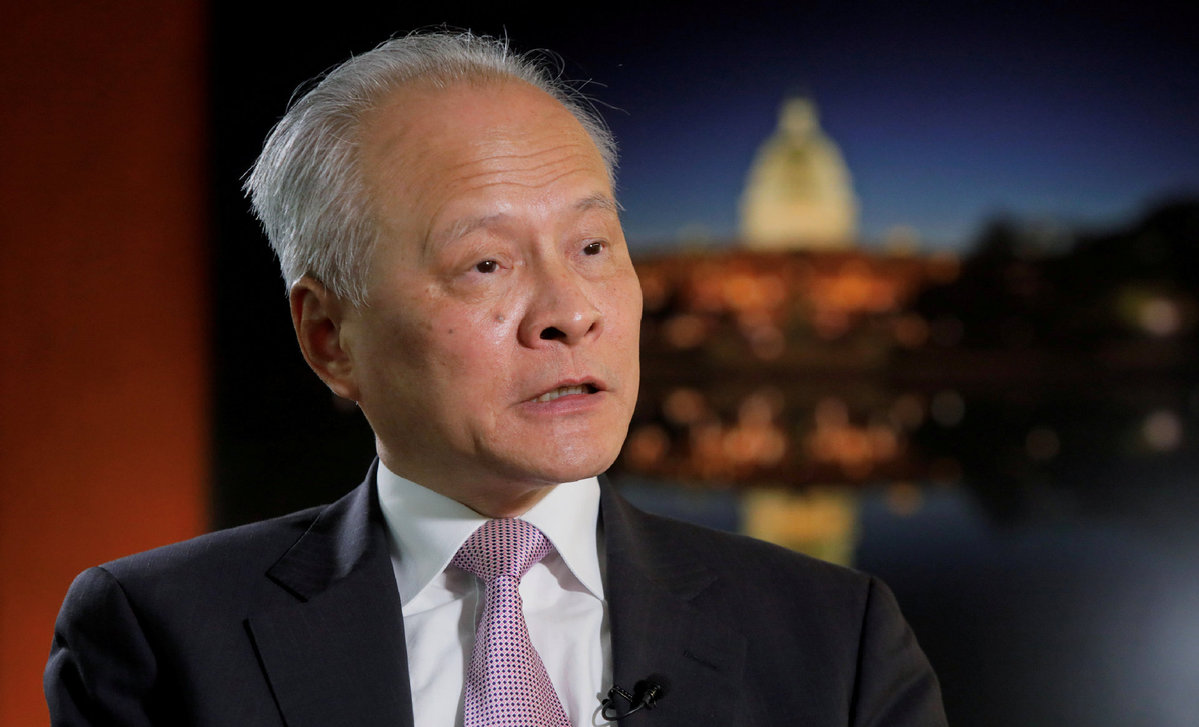Cui Tiankai reassures US residents of HK
By ZHAO HUANXIN in Washington | China Daily Global | Updated: 2020-06-01 14:16

For the tens of thousands of US citizens living and working in Hong Kong, Beijing's top envoy in Washington has a clear message: China's recent national security legislation on the region will only make the port city safer and more secure for them.
More than 1,350 US multinational companies have offices in Hong Kong, which is also inhabited by at least 85,000 Americans, according to information from China's Foreign Ministry and the Hong Kong Special Administrative Region (HKSAR) government.
Reports were rife in some foreign media in recent days that China's national security laws to be promulgated and enforced in Hong Kong cast a "dark cloud" over the fate of the US businesses and American residents in the HKSAR and would jeopardize the future of the region.
On Thursday, as the National People's Congress (NPC), China's top legislative body, wrapped up its annual session, Chinese lawmakers voted overwhelmingly at the meeting to approve a decision on establishing and improving the legal system and enforcement mechanisms for the HKSAR to safeguard national security.
"Many Americans who live and work in Hong Kong may wonder what the legislation will mean for them. The answer is that it will provide a safer and more secure environment," said Cui Tiankai, China's ambassador to the US, in a weekend op-ed on bloomberg.com.
"The legislation is only targeted at actions that jeopardize China's national security, such as splitting the country, subverting the government, committing terrorist activities and externally meddling in Hong Kong affairs," he wrote.
"People who have nothing to do with these should have no worries," he added.
Cui pointed out that a stable and prosperous Hong Kong will bring more opportunities to its residents and investors.
"In fact, the legislation will protect law-abiding citizens, ensure Hong Kong's high degree of autonomy and contribute to a sound legal and business environment there," the ambassador wrote.
Talking about the legitimacy of the legislation, Cui said that in all countries, unitary and federal alike, only the central government has the legislative authority to decide issues concerning national security.
"Similarly, China's central government has the primary and ultimate responsibility for upholding national security, and the NPC is the highest-level legislature in China," he said.
Paul Chan, the HKSAR government's financial secretary, also said in a blog post Sunday that the national security legislation is aimed at restoring peace and a safe and stable business environment and that there is no need for businesses to worry about it.
The US has important interests in Hong Kong. Almost all major US financial companies operate in the region, and the US trade surplus with the area has grown to $297 billion in the past decade, ranking first among US global trading partners, according to a release from China's Foreign Ministry on Friday.
Hong Kong is often a transfer point for US exports ultimately destined for Chinese mainland, according to the "2020 State Export Report", a study released by the US-China Business Council in April.
There was a 16.2 percent decline in US exports to Hong Kong, knocking it off the top 10 list last year, but Hong Kong remained a top-five services export market for Alaska in 2018 and a top-five goods export destination for New York state ($5.4 billion) and Vermont ($198 million) in 2019, according to the report, which looks at goods and services exports by US states to China over the past decade.
"You'd be shooting yourself in the foot" if the US administration cut off Hong Kong on trade and other economic relations, said Nicholas Lardy, a specialist on China's economy at the Peterson Institute for International Economics, as quoted in the Los Angeles Times on Thursday.
























